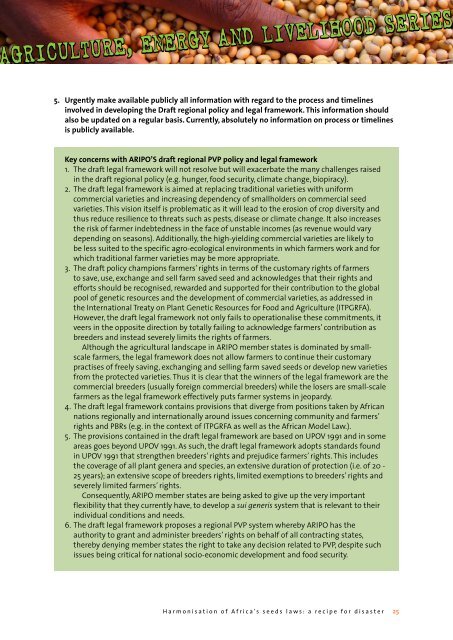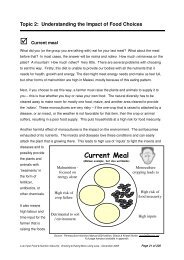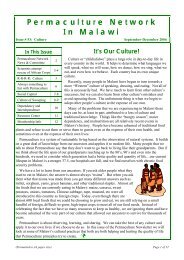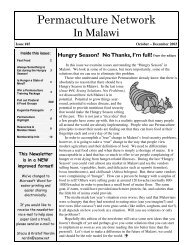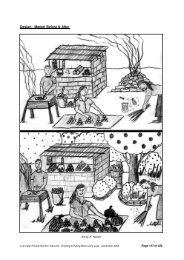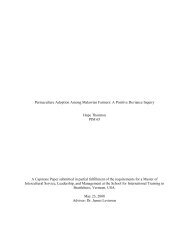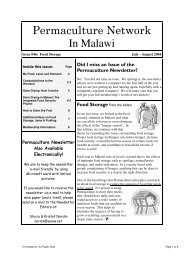Harmonisation of seed laws in Africa.indd - Never Ending Food
Harmonisation of seed laws in Africa.indd - Never Ending Food
Harmonisation of seed laws in Africa.indd - Never Ending Food
Create successful ePaper yourself
Turn your PDF publications into a flip-book with our unique Google optimized e-Paper software.
GRICULTURE, ENERGY AND LIVELIHOOD SERIES<br />
5. Urgently make available publicly all <strong>in</strong>formation with regard to the process and timel<strong>in</strong>es<br />
<strong>in</strong>volved <strong>in</strong> develop<strong>in</strong>g the Draft regional policy and legal framework. This <strong>in</strong>formation should<br />
also be updated on a regular basis. Currently, absolutely no <strong>in</strong>formation on process or timel<strong>in</strong>es<br />
is publicly available.<br />
Key concerns with ARIPO’S draft regional PVP policy and legal framework<br />
1. The draft legal framework will not resolve but will exacerbate the many challenges raised<br />
<strong>in</strong> the draft regional policy (e.g. hunger, food security, climate change, biopiracy).<br />
2. The draft legal framework is aimed at replac<strong>in</strong>g traditional varieties with uniform<br />
commercial varieties and <strong>in</strong>creas<strong>in</strong>g dependency <strong>of</strong> smallholders on commercial <strong>seed</strong><br />
varieties. This vision itself is problematic as it will lead to the erosion <strong>of</strong> crop diversity and<br />
thus reduce resilience to threats such as pests, disease or climate change. It also <strong>in</strong>creases<br />
the risk <strong>of</strong> farmer <strong>in</strong>debtedness <strong>in</strong> the face <strong>of</strong> unstable <strong>in</strong>comes (as revenue would vary<br />
depend<strong>in</strong>g on seasons). Additionally, the high-yield<strong>in</strong>g commercial varieties are likely to<br />
be less suited to the specific agro-ecological environments <strong>in</strong> which farmers work and for<br />
which traditional farmer varieties may be more appropriate.<br />
3. The draft policy champions farmers’ rights <strong>in</strong> terms <strong>of</strong> the customary rights <strong>of</strong> farmers<br />
to save, use, exchange and sell farm saved <strong>seed</strong> and acknowledges that their rights and<br />
efforts should be recognised, rewarded and supported for their contribution to the global<br />
pool <strong>of</strong> genetic resources and the development <strong>of</strong> commercial varieties, as addressed <strong>in</strong><br />
the International Treaty on Plant Genetic Resources for <strong>Food</strong> and Agriculture (ITPGRFA).<br />
However, the draft legal framework not only fails to operationalise these commitments, it<br />
veers <strong>in</strong> the opposite direction by totally fail<strong>in</strong>g to acknowledge farmers’ contribution as<br />
breeders and <strong>in</strong>stead severely limits the rights <strong>of</strong> farmers.<br />
Although the agricultural landscape <strong>in</strong> ARIPO member states is dom<strong>in</strong>ated by smallscale<br />
farmers, the legal framework does not allow farmers to cont<strong>in</strong>ue their customary<br />
practises <strong>of</strong> freely sav<strong>in</strong>g, exchang<strong>in</strong>g and sell<strong>in</strong>g farm saved <strong>seed</strong>s or develop new varieties<br />
from the protected varieties. Thus it is clear that the w<strong>in</strong>ners <strong>of</strong> the legal framework are the<br />
commercial breeders (usually foreign commercial breeders) while the losers are small-scale<br />
farmers as the legal framework effectively puts farmer systems <strong>in</strong> jeopardy.<br />
4. The draft legal framework conta<strong>in</strong>s provisions that diverge from positions taken by <strong>Africa</strong>n<br />
nations regionally and <strong>in</strong>ternationally around issues concern<strong>in</strong>g community and farmers’<br />
rights and PBRs (e.g. <strong>in</strong> the context <strong>of</strong> ITPGRFA as well as the <strong>Africa</strong>n Model Law.).<br />
5. The provisions conta<strong>in</strong>ed <strong>in</strong> the draft legal framework are based on UPOV 1991 and <strong>in</strong> some<br />
areas goes beyond UPOV 1991. As such, the draft legal framework adopts standards found<br />
<strong>in</strong> UPOV 1991 that strengthen breeders’ rights and prejudice farmers’ rights. This <strong>in</strong>cludes<br />
the coverage <strong>of</strong> all plant genera and species, an extensive duration <strong>of</strong> protection (i.e. <strong>of</strong> 20 -<br />
25 years); an extensive scope <strong>of</strong> breeders rights, limited exemptions to breeders’ rights and<br />
severely limited farmers’ rights.<br />
Consequently, ARIPO member states are be<strong>in</strong>g asked to give up the very important<br />
flexibility that they currently have, to develop a sui generis system that is relevant to their<br />
<strong>in</strong>dividual conditions and needs.<br />
6. The draft legal framework proposes a regional PVP system whereby ARIPO has the<br />
authority to grant and adm<strong>in</strong>ister breeders’ rights on behalf <strong>of</strong> all contract<strong>in</strong>g states,<br />
thereby deny<strong>in</strong>g member states the right to take any decision related to PVP, despite such<br />
issues be<strong>in</strong>g critical for national socio-economic development and food security.<br />
<strong>Harmonisation</strong> <strong>of</strong> <strong>Africa</strong>’s <strong>seed</strong>s <strong>laws</strong>: a recipe for disaster 25


